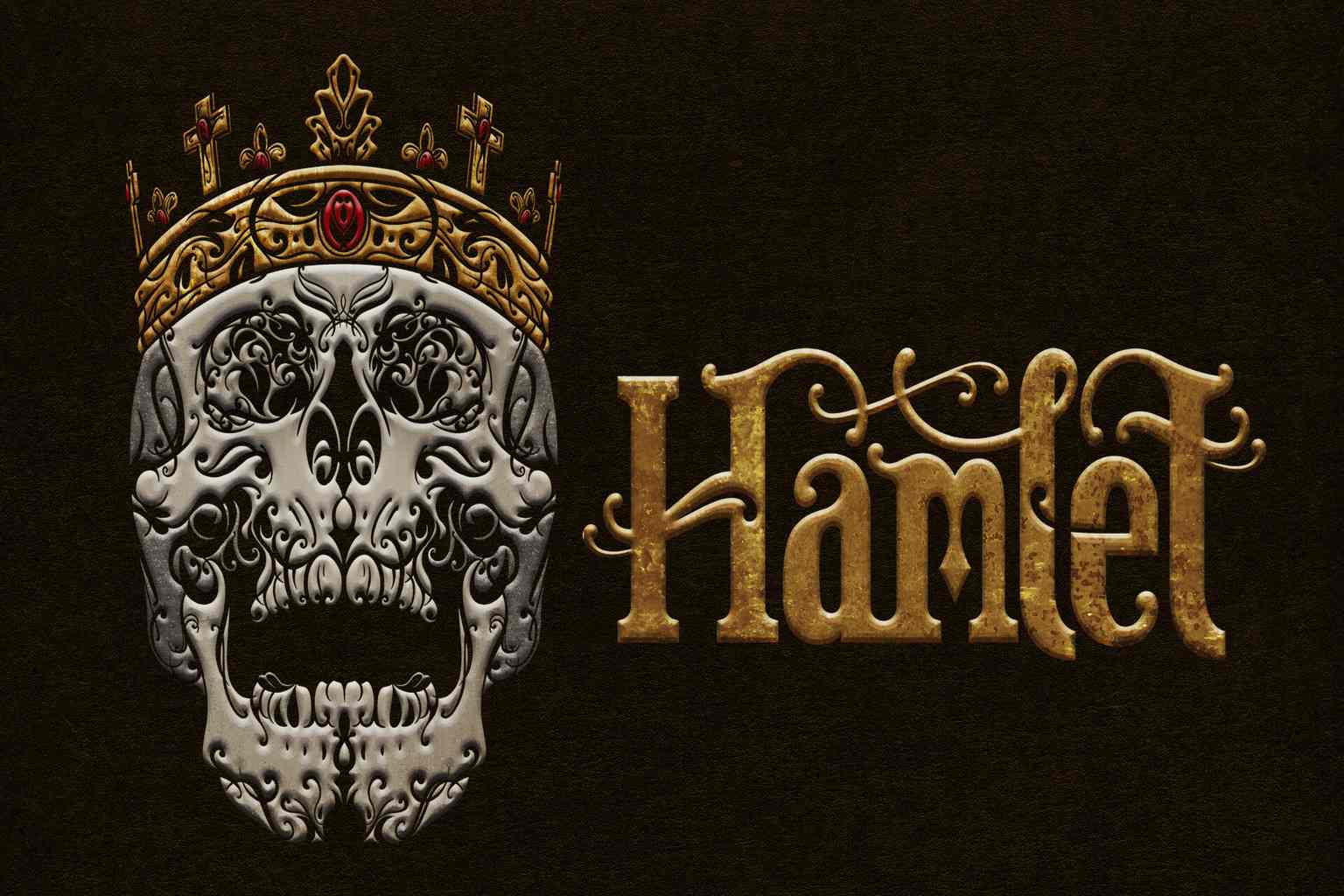When you think of Shakespeare’s Hamlet, chances are you will also think about pale apparitions, cold castles, and a dismal man holding a skull. Though we all know Hamlet to be a tragic story of revenge, madness, and death, there is, however, more to it than meets the eye. Not only do you find the struggles of the characters relatable, centuries later, still, in our modern society. But buried beneath that old and artistic dialogue delivery, you find that the lessons from Hamlet are quite relevant even today.
There are no ifs and buts about the fact that this play is quite ahead of its time. It delves into the psychological, emotional, and spiritual complexities of humans. It encourages its audience to introspect on their life and principles. Just like Hamlet, we too find ourselves pondering the choices we have made in life, the fear that comes along with it, and the futility of it all. So, let us explore the life lessons from Hamlet that hold true today, just as they did when Shakespeare first wrote it.
A Glimpse Into Shakespeare’s Mind
Hamlet is undoubtedly one of Shakespeare’s best works. Inspired by the Scandinavian legend of Amleth, the play takes the themes of betrayal, revenge, feigned madness, and death from the legend. Both the legend Amleth and the play Hamlet are stories of intrigue, where a Danish prince avenges the murder of his father, the late king, by killing the usurper, his uncle. However, the intricate details of the character, the plots, and the dialogues are a window to Shakespeare’s internal battles as well as the political turmoil within England.
One element that has been addressed often in Hamlet is death. Not just the physical passing of a person, but also topics like grief, the afterlife, and the meaning of life, are explored in the play. The consequences of revenge on one’s soul, and the dangers of overthinking and delaying actions have also been shed light upon. Dialogues like “O, that this too too solid flesh would melt.” or the famous soliloquy “To be, or not to be.” may have been the result of Shakespeare’s existential sorrows, having recently lost both his father and his son Hamnet.
Another interesting fact worth noticing is that Hamlet was written towards the end of Queen Elizabeth’s reign. In the play, the Danish court is seething with deception, intrigue, and conspiracy, reflecting Shakespeare’s political distrust due to the uncertainty of succession at the end of the Elizabethan Era.
While it is virtually impossible to pinpoint what exactly inspired the writer to pen such a play, the life lessons from Shakespeare’s plays are anything but ambiguous, and Hamlet is the perfect example of that. Let’s look at some of the lessons that Hamlet can teach us.
1. The dangers of indecision
Throughout the play, you encounter Hamlet’s internal war. On one hand, he wants to avenge his father’s death by killing Claudius, his uncle. On the other hand, his conscience doesn’t allow him to commit the act. Even when he finds Claudius vulnerable, his thoughts on the morality of the act overwhelm him to such a level that he freezes and is unable to exact his revenge.
One of the first things you begin to understand and learn when you read Hamlet is that overthinking can have fatal consequences. The combination of Hamlet’s obsession with revenge and indecisiveness leads to the death of his mother and many others, including himself. It also affects his mental stability so much that his behavior changes and becomes erratic, and he ends up isolating himself.
2. The complexity of revenge
Revenge is one of the most important elements of Hamlet. And Shakespeare shows it through three of his characters, Hamlet, Laertes, and Fortinbras. While all of them want revenge for the death of their fathers, they all have a different approach to it.
- Hamlet wants a perfect revenge that hurts Claudius, not just physically, but also spiritually. However, his morality makes him hesitate and delay the act, leading to dire consequences.
- Laertes’s revenge is purely fueled by the anger and grief of losing his father. He rushes into action with little thought or reflection.
- Fortinbras’s revenge is measured and decisive. This amplifies Hamlet’s habit of procrastination and indecisiveness.
In the play, we find out that revenge never ends with just one incident. Its effect cascades and brings about more ruin than resolution. What does Hamlet teach us about revenge? It teaches us that even though revenge is emotionally powerful and, to an extent, gratifying, it can also bring about guilt, mental instability, and the destruction of everything we hold dear.
3. Appearance vs. reality
One of the lessons from Hamlet is that all that glitters isn’t gold. In the play, Claudius pretends to be a noble king, but instead turns out to be a murderer. Polonius is depicted as someone wise, but in reality, he is manipulative. Even the main protagonist, Hamlet, pretends to be mad to uncover the truth. The prince also conducts a play to reveal hidden guilt. Soon enough, you come to realise that everyone is wearing a facade to facilitate their ulterior motives.
The play Hamlet warns us that people wear masks and hide true intentions behind words and smiles. That people will use whatever means necessary to cater to their own needs and do what they think is right, irrespective of what the reality may be.
4. Madness—real and feigned
There are two types of madness that the audience comes across in the play. One is Ophelia, who goes insane after losing her father and getting rejected by Hamlet. Her speech stops making sense and becomes disturbing, and takes the form of sorrowful songs. And the other is Hamlet’s madness, who pretends to be insane to avoid suspicion while he investigates Claudius, as well as spouts out the truth that a sane person would be afraid to speak out aloud.
While Ophelia’s madness is real and eventually leads to her death, Hamlet’s madness is feigned, and he weaponises it. However, one of the vital life lessons from Hamlet is that there is a very fine line between sanity and madness, and sometimes the line gets blurred. Even though Hamlet was sane, his obsession with revenge made him mentally unstable. He begins to question his thoughts and starts isolating himself.
5. The inevitability of death
From the first act, where Hamlet meets the ghost of his father, to the end, when he himself meets his maker, death is ever present in this play. As his obsession with revenge grows, Hamlet is also seen struggling with mortality and pondering the meaning of life. In the scene where he holds Yorick’s skull in his hand, he realizes that death doesn’t differentiate between the rich, the poor, the powerful, or the famous. It comes for everybody.
As far as life lessons from Shakespeare’s plays go, this is by far the most potent. Hamlet reminds us that everything that is born eventually perishes. Death is the great equalizer, and there is no escaping it. The best we can do is accept it as a natural order of things.
Conclusion
Hamlet is truly a progressive play for its time. It explored the difficult topics like betrayal, deceit, and the pain of existential crisis. The lessons from Hamlet are timeless. It teaches us the futility of revenge, of how words and looks can be used to mislead people, and how death treats everyone equally. What makes Hamlet a masterpiece is that when you ask what does Hamlet teach us about revenge, and its consequences? The answers are still relatable and useful four hundred years later.
FAQ
1. What are the main themes in Hamlet?
Hamlet is a play that deals with some of the most common trials that every human being faces. While the story is a revenge tragedy, you also see Hamlet deal with deception, betrayal, moral decay, and death. Through the play, Hamlet is observed to have an existential crisis. His feigned madness begins to affect his sanity and his constant indecisiveness leads to the death of loved of a number of people, including himself.
2. How do Hamlet’s actions reflect human nature?
The dilemma that Hamlet faces in the play about the morality of his action, his grief at the loss of a loved one, his thoughts on life as he is faced with death, and the distrust he develops for everyone around him etc all mirror the thoughts and emotions everyone goes through at some point in their life.
3. Why is Hamlet considered Shakespeare’s greatest work?
Hamlet is undeniably one of Shakespeare’s greatest works. All the characters created for this play are complex and yet relatable. Add to it the artistry of words and well-thought-out scenes, and you have a timeless classic in your hands. In a short frame of time, Hamlet makes you feel some very deep emotions, and through it all, you understand his dilemma and motives. You can’t help but feel for the characters and their plight.
Of Strings And Scars: 11 Life Lessons From The Kite Runner By Khaled Hosseini




